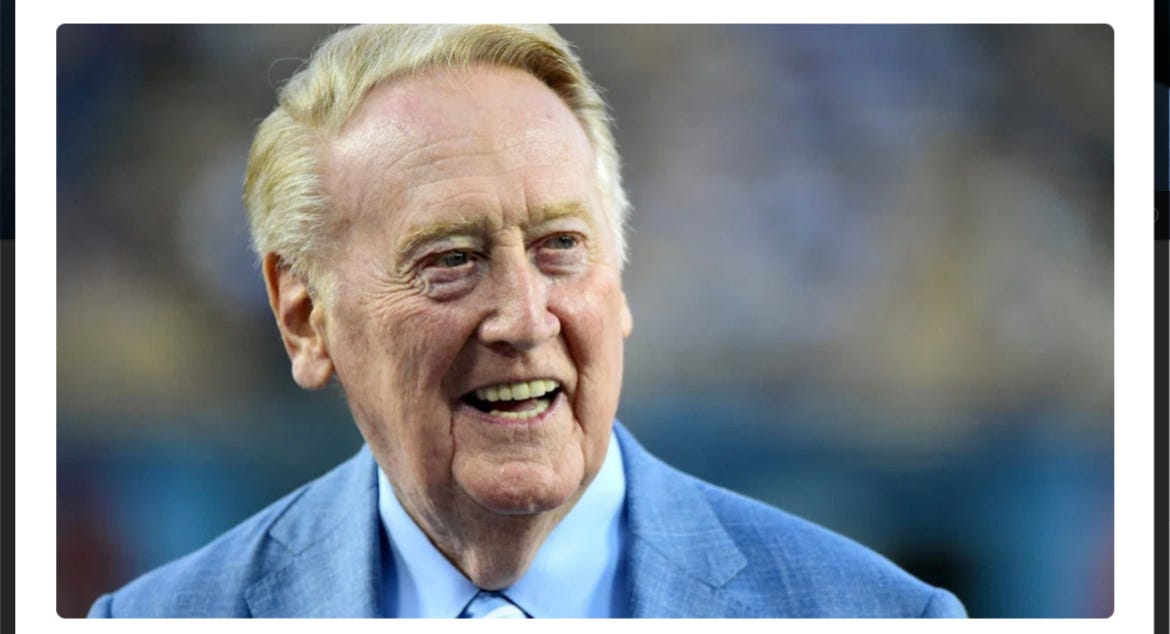The Last Uncancellable Man: on Vin Scully
I do not charge for subscriptions any longer, and my writing is free to all, but if you are interested in supporting me and my work, I would very much welcome the one-time or occasional cup of coffee. You can buy me one here. Thank you!
My new website for my writing and coaching business can be found here.
Vin Scully, the legendary broadcaster for the Los Angeles Dodgers, died yesterday at 94.
Baseball is not now, nor will it ever be, my sport. As far as my interest is concerned, it ranks below rodeo, college football, the NFL, track, and soccer —but somewhere above hockey, cricket, and Formula One. I don’t have the patience for the traditional American summer pastime; my attention span is best suited to rodeo, an activity in which almost every event is measured in desperate handfuls of dangerous seconds.
On the other hand, I have been an Angeleno by circumstance for 33 years now, and the circumstances decree that I ought to retain at least a moderate fondness for the Dodgers. I don’t know that I ever listened to more than a handful of games that Scully called before his 2016 retirement, but every time I did, I found what everyone else found — the extraordinary timbre and calm of his voice, the gift for precision and understatement, and the unparalleled ability to tell a story, often weaving anecdotes in and around the play-by-play without ever once confusing or boring his listeners.
There are many marvelous remembrances of the broadcaster online. If you can get past the paywall, I recommend the gorgeous obit from Scully’s nephew, the conservative columnist Dan McLaughlin, in the National Review. I also enjoyed the moving tributes in the LA Times from Bill Plaschke and Gustavo Arellano.
Over and over again, on social media and in conversations, one hears the same refrain: “Everyone loved Vin.” Last night, my Instagram exploded with photos and videos of Scully — including many posted by friends whom I know care less for baseball than I do. He was an uncle figure, a grandfather figure. He knew baseball wasn’t the only thing, but he made it into a meaningful, even transcendent distraction, and the comfort that brought was immeasurable.
The last time L.A. lost a sports hero as beloved, it was Kobe Bryant, who perished with his daughter and their companions on that foggy Calabasas hillside. It is a different tenor of grief when young men and children die suddenly; the eulogies are shot through with shock and anguish, and wistfulness about what might have been. Kobe had immense talent, dedication, and genuine charm. He also had a dark side — the allegations of a rape, the infidelities, and an on-court demeanor that not infrequently veered into selfishness. Even in the hours after Kobe was killed, plenty of journalists chose to “go there” and focus on the less salubrious aspects of the star’s remarkable life.
Kobe was complicated, as people generally are; what stands out about Scully is that as far as we know, there’s not even a whiff of the problematic. In 2022, to have a public man die and not have someone, somewhere, suggest we also remember the darker side? Responsible journalism requires more than tears and hagiography; we may not want a hit piece on the departed, but we expect to learn of the deceased’s mistakes as well as their triumphs.
We aren’t supposed to give “passes” for bigotry in even its mildest forms. We are, in 2022, supposed to call out even our elders if they say what our up-to-the-minute mores declare newly unacceptable. No one is above criticism. In the Times, Gustavo Arelllano —who regularly skewers political figures for their racism or revanchism, writes today:
“One of the many clips local television is playing right now is from 1990, when Fernando Valenzuela — another Dodgers Latino icon — threw a no-hitter. As the southpaw and his teammates celebrated, Scully exclaimed, “If you have a sombrero, throw it to the sky.”
Anyone else said it, you’d wince. But he was our red-headed tío.
Arellano — and everyone else — judges Scully on his heart, or the heart they are sure they know. It was once a standard defense to say, “He means well,” or “You know there’s not a racist bone in his body.” In our harsher and more politically aware age, those excuses generally don’t fly. Except when they do, and a man like Vin Scully is beloved enough, admired enough, and trusted enough to be able to transcend the smart set’s rigid rules. (Scully even gets away with having a very senior writer for the National Review as his beloved nephew! No guilt by association? That’s rare too these days.)
I wonder if Arellano thinks there can be another red-headed (or blonde) tío who might get a similar pass, or if Scully was the last of the uncancellable, perhaps the last untarnished angel in the city named for them.
The world would be a much better and kinder place if we had more obituaries like Gustavo’s. “But he was our red-headed tio” — you can put it a thousand different ways, the generous wisdom of that “but” cancelling out any hint of reproach for how the very human dead lived their gloriously meaningful yet imperfect lives. I’d like to think we can get there. I don’t know if a culture built on cynicism and outrage will permit it.
Los Angeles will grieve you, Vin Scully. You were incomparable and irreplaceable. May we also be inspired by this ungrudging and uncomplicated celebration of a very long and fascinating life, and decide that perhaps others deserve this same outpouring, unmarred by the requisite and repetitive reminders of human frailty.



